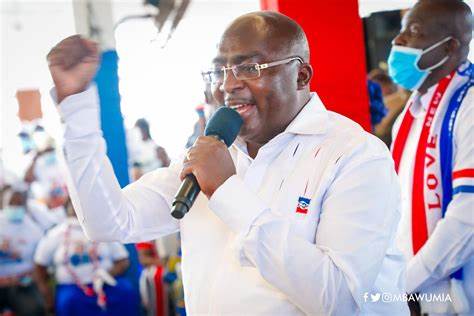Recently, the discussion of the electoral performance of NPP in 2024 has been shifted to the theories of Incumbency Advantage and Incumbency Disadvantage. That is a very good discussion, and it is important that we expose the LIES which some people have been spinning to whitewash data in favour of their preferred Presidential candidate.
Incumbency Advantage Theory And Its Impact On Ghana Elections
Incumbency Advantage typically refers to the benefits that a Presidential candidate of a ruling party has over opposition Presidential candidates when seeking re-election, especially after completing the first term in government.
Some of the benefits of Incumbency Advantage, especially within the first term in government, are access to resources, well-established donor & sponsor networks, goodwill of the citizens (voters), and greater tolerance & patience levels of the citizens (voters). These aforementioned factors greatly influence the voting patterns, behaviors, and decisions of the voters in favour of the Presidential candidate who is already in government. Incumbent Presidential candidates typically win re-election at a much higher rate than opposition Presidential candidates, especially after the end of the 4 year mandate.
J. J. Rawlings, John Agyekum Kufuor, John Mahama, and Nana Akufo-Addo enjoyed an Incumbency Advantage Theory under the 1992 Constitution of the Republic of Ghana. However, let’s analyze their respective performance in accordance with the Incumbency Advantage Theory:
Jerry John Rawlings in 1996
After overwhelmingly winning the 1992 Presidential election with 2, 323, 135 votes, and Parliamentary Seats of 189 out of 200 Seats, largely due to the poor decision by the New Patriotic Party (NPP) to boycott the 1992 Parliamentary election, J. J. Rawlings with an incumbent advantage decisively won the 1996 Presidential election with 4, 099, 758 votes, and Parliamentary seats of 134 out of 200 seats.
John Agyekum Kufuor in 2004
After the overwhelming victory in the 2000 Presidential election with 3,631,263 votes, and Parliamentary Seats of 99 out of 200 seats, John Agyekum Kufuor, with an incumbent advantage, won the 2004 Presidential election with 4, 524, 074 votes, and Parliamentary seats of 128 out of 230 seats.
John Atta Mills/John Mahama in 2012
After narrowly winning the 2008 Presidential election with a vote difference of 40,586 between him and Nana Akufo-Addo, and Parliamentary seats of 116 out of 230, John Atta Mills unfortunately died on 24th July, 2012.
Due to the unfortunate death of John Atta Mills, John Mahama, with an Incumbent Advantage, contested the 2012 Presidential election and won with 5,574,761 votes, and Parliamentary seats 148 out of 275 Seats.
Nana Akufo-Addo in 2020
After overwhelmingly winning the 2016 Presidential election with 5,755,758 votes and Parliamentary seats of 169 out of 275 seats, Nana Akufo-Addo, with an Incumbent Advantage, won the 2020 Presidential election with 6,730,587 votes and Parliamentary seats of 137 out of 275 seats. The Parliamentary performance of Akufo-Addo in 2020 was poor compared to the 2016 Parliamentary seats he won decisively.
Incumbency Disadvantage Theory And Its Impact On Ghana Elections
Incumbency Disadvantage is typically whereby an incumbent Presidential candidate faces significant difficulties/challenges to win re-election after 8 years in government, especially if the incumbent Presidential candidate is not the sitting President at the time of the general election.
Some of the factors underpinning Incumbency Disadvantage Theory are poorer economic conditions, structural shift in internal party competition, greediness of government appointees, voter’s apathy, failed promises, entrenchment mentality of the Candidate and people within his kitchen cabinet, voter’s impatience, reported cases of corruption, the trustworthy & acceptability of the Presidential candidate, and other factors not mentioned here.
John Atta Mills, Nana Akufo-Addo, John Mahama, and Dr. Mahamudu Bawumia suffered defeats in their respective general elections largely due to the Incumbency Disadvantage Theory; however, let’s analyze the magnitude of the defeats in accordance with the Incumbency Disadvantage Theory:
John Atta Mills in 2000
John Atta Mills’ first entry into partisan politics was in 1996 when he was nominated by J. J. Rawlings as his Vice-President.
John Atta Mills first attempt at the Presidency was in 2000 general election and despite Incumbency Disadvantage of being in power for 8 years + 11years of his boss Rawlings’ PNDC regime, John Atta Mills successfully pushed the 2000 presidential election to a run-off (second round) with presidential votes of 2, 750, 124, and Parliamentary seats of 92 out of 200 seats while NPP had 99 out of 200 seats.
NPP won the 2000 Parliamentary elections with only 7 seats difference between them and NDC.
John Atta Mills lost to John Agyekum Kufuor after the second round in the 2000 general elections with a vote difference of 881,139 between him and John Agyekum Kufuor.
John Atta Mills lost the 2000 Presidential and Parliamentary elections with Dignity & Respectable Performance.
John Atta Mills was the first Ghanaian sitting Vice-President under the 1992 Constitution to have contested a national presidential election influenced by Incumbency Disadvantage Theory since his party had been in government for 8 years.
Nana Akufo-Addo in 2008
Regardless of the symptoms of Incumbency Disadvantage Theory, the performance of Nana Akufo-Addo in the 2008 general election is the BEST performance witnessed under the 1992 Constitution of the Republic of Ghana.
Nana Akufo-Addo wasn’t a sitting Vice-President yet delivered one of the outstanding election results under the conditions of Incumbency Disadvantage Theory(NPP being in government for 8years).
Nana Akufo-Addo lost the 2008 Presidential election to John Atta Mills with 40, 586 votes difference between him and John Atta Mills.
Nana Akufo-Addo lost the 2008 Presidential election after the Run-Off (second round), with Tain eventually deciding the winner of the 2008 Presidential election.
Nana Akufo-Addo equally won 107 Parliamentary Seats out of 230 Seats for the NPP, while the NDC had 116 Parliamentary seats out of 230 seats. The difference between NDC and NPP in terms of Parliamentary seats after the 2008 general election was 9 Seats.
John Mahama in 2016
The 2016 general election was a great political dilemma for the ruling NDC because the party itself had been in government for 8 years, suffering under Incumbency Disadvantage Theory, yet John Mahama, the NDC 2016 Presidential candidate, had been in office as an elected President for 4years, who he was to benefit from Incumbency Advantage Theory.
However, the Incumbency Disadvantage Theory (8years of a ruling party) worked against John in the 2016 general election.
John Mahama terribly lost the 2016 general election to Nana Akufo-Addo with a vote difference of 984,570 between him and Nana Akufo-Addo.
John Mahama won 106 Parliamentary seats out of 275 seats for the NDC, while Nana Akufo-Addo secured 169 Parliamentary seats for the NPP.
The difference between NPP and NDC in terms of Parliamentary seats after the 2016 general election was 63 seats.
Dr. Mahamudu Bawumia in 2024
The expectations for breaking the 8-year cycle were extremely high and hopeful among the supporters of the New Patriotic Party (NPP), largely because there was a firm belief that Dr. Mahamudu Bawumia would always be preferred to John Mahama as far as voters’ preferences were concerned. However, the Incumbency Disadvantage Theory (8 years of a ruling party) worked against Dr. Mahamudu Bawumia.
Dr. Mahamudu Bawumia was the second sitting Vice-President to have contested a national presidential election under the 1992 Constitution, influenced by Incumbency Disadvantage Theory.
The only difference between John Atta Mills and Dr. Mahamudu Bawumia was that, at the time of the general elections, John Atta Mills had been a Vice-President for 4 years ahead of the 2000 general election, while Dr. Mahamudu Bawumia had been a Running-Mate for 8years and Vice-President for 8 years ahead of the 2024 general election.
Dr. Mahamudu Bawumia lost the 2024 presidential election to John Mahama with 1, 714, 179 (275 out of 276 declared Constituencies). Losing an election with almost 2 Million Votes is a very serious historic crisis that the members of NPP shouldn’t consider such performance as normal, whitewashing the data with unintelligent analysis of New-Old Candidate Assumptions Model, and Incumbency Advantage Theory -Incumbency Disadvantage Theory.
2024 was the first time a ruling party has been defeated with such magnitude. John Atta Mills lost the 2000 after the second round, Nana Akufo-Addo lost the 2008 after the second round & Tain declaration, and John Mahama lost the 2016 with 984,570 votes, yet with 106 Parliamentary seats out of 275.
Dr. Mahamudu Bawumia, after the 2024 Parliamentary election, won 88 seats out of 276 seats, while John Mahama won 183 seats out of 276 seats.
The difference between NDC and NPP in terms of Parliamentary seats after the 2024 general election was overwhelmingly 95 seats.
Therefore, some of the people relying on Incumbency Advantage Theory-Incumbency Disadvantage Theory as well as New-Old Candidate Assumptions Model, should understand that DATA & FACTS don’t support such lying analysis.
Deficiencies of Incumbency Disadvantage Theory
There are several examples, but for the purpose of this Article, I will limit myself to:
- Asiwaju Bola Ahmed Adekunle Tinubu won the 2023 Presidential election of Nigeria in a single round, though his Party has been in government for 8years.
- William Ruto won the 2022 Presidential election of Kenya after being a Deputy President from 9th April 2013 – 13th September 2022(9years).
Deficiencies of Incumbency Advantage Theory
There are several examples, but for the purpose of this Article, I will limit myself to:
- Donald Trump lost the 2020 Presidential election of the United States of America after one term in government(4years)
- George Manneh Oppong Weah lost the 2023 Presidential election of the Liberal Party after one term in government(6years)
Issued by: Razak Kojo Opoku(PhD)
Founding President of UP Tradition Institute




